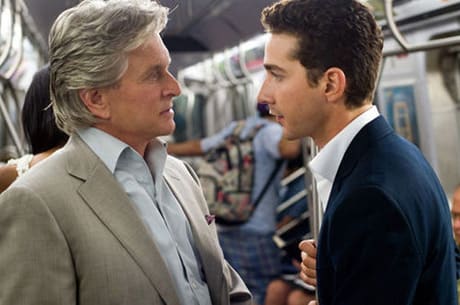There's something just a little sad about the way Gordon Gekko looks in Wall Street: Money Never Sleeps. Check out his hair, which sweeps in giant cartoon waves in opposite directions, strands at the back threatening to become a mullet, comb marks visible in the dried gel, appearing as extensions of his many deep wrinkles.
When Jake Moore (Shia LaBeouf), a "hotshot" Wall Street trader engaged to Gekko's daughter, visits the old man's apartment (a rental ― the ultimate indignity), we see Gekko dressed casually in a flowing, slightly shiny blue shirt unbuttoned far enough to appear, shall we say, ill-advised. The aged Gekko is a man who has been in prison too long trying to appear slick.
That Oliver Stone isn't one for subtlety isn't news, but the man sometimes knows how to push the right buttons, and as inessential as his sequel to Wall Street (1987) is, there's some enjoyment to be derived from simple, sensual pleasures. In addition to Douglas's impeccable hairstyles, I liked everything about Bretton James (Josh Brolin), a Gordon Gekko 2.0 who's currently the wolf of Wall Street. He's all greasy, jet-black hair, smarmy smiles, massive cigars and perfectly tailored clothing (in addition, of course, to Brolin's square-jawed good looks). When Jake visits his office, he's surrounded by dark wood, horrific paintings and a perpetual cloud of hazy cigar smoke. Clearly a certain sinister Biblical figure is being invoked.
Such pleasures only go so far. Jake's mentor, Louis Zabel (Frank Langella), was a past-his-prime Wall Street tycoon who Bretton drove to suicide. After Jake reluctantly agrees to work for Bretton, we see Zabel's ghostly, disapproving visage behind him. Again, Stone isn't one for subtlety ― there's always a music cue or a montage to tell us what to think.
Wall Street: Money Never Sleeps is Stone's response to the stock market crash of 2008 and the irresponsible behaviour that caused it. As with previous film W., it's the type of movie that would have been the most talked about film of two or three years ago, but feels redundant today. (Although I did enjoy this comment from a trader about the government bailout: "You're talking about nationalization ― socialism!")
There's also a lot of time spent on Gekko's efforts to reconcile with his daughter (Carey Mulligan). We've seen this melodramatic stuff many, many times before, although we've rarely seen it with such a pathetically contrived ending.
Still, there is Michael Douglas, who keeps getting better as he gets older. His performance combines the oily slickness of Gordon Gekko 1987 and the aging desperation of Solitary Man's Ben Kalmen into a pitiable, curiously empathetic creature who has two modes: insincere grinning and pouting.
(Fox)When Jake Moore (Shia LaBeouf), a "hotshot" Wall Street trader engaged to Gekko's daughter, visits the old man's apartment (a rental ― the ultimate indignity), we see Gekko dressed casually in a flowing, slightly shiny blue shirt unbuttoned far enough to appear, shall we say, ill-advised. The aged Gekko is a man who has been in prison too long trying to appear slick.
That Oliver Stone isn't one for subtlety isn't news, but the man sometimes knows how to push the right buttons, and as inessential as his sequel to Wall Street (1987) is, there's some enjoyment to be derived from simple, sensual pleasures. In addition to Douglas's impeccable hairstyles, I liked everything about Bretton James (Josh Brolin), a Gordon Gekko 2.0 who's currently the wolf of Wall Street. He's all greasy, jet-black hair, smarmy smiles, massive cigars and perfectly tailored clothing (in addition, of course, to Brolin's square-jawed good looks). When Jake visits his office, he's surrounded by dark wood, horrific paintings and a perpetual cloud of hazy cigar smoke. Clearly a certain sinister Biblical figure is being invoked.
Such pleasures only go so far. Jake's mentor, Louis Zabel (Frank Langella), was a past-his-prime Wall Street tycoon who Bretton drove to suicide. After Jake reluctantly agrees to work for Bretton, we see Zabel's ghostly, disapproving visage behind him. Again, Stone isn't one for subtlety ― there's always a music cue or a montage to tell us what to think.
Wall Street: Money Never Sleeps is Stone's response to the stock market crash of 2008 and the irresponsible behaviour that caused it. As with previous film W., it's the type of movie that would have been the most talked about film of two or three years ago, but feels redundant today. (Although I did enjoy this comment from a trader about the government bailout: "You're talking about nationalization ― socialism!")
There's also a lot of time spent on Gekko's efforts to reconcile with his daughter (Carey Mulligan). We've seen this melodramatic stuff many, many times before, although we've rarely seen it with such a pathetically contrived ending.
Still, there is Michael Douglas, who keeps getting better as he gets older. His performance combines the oily slickness of Gordon Gekko 1987 and the aging desperation of Solitary Man's Ben Kalmen into a pitiable, curiously empathetic creature who has two modes: insincere grinning and pouting.




